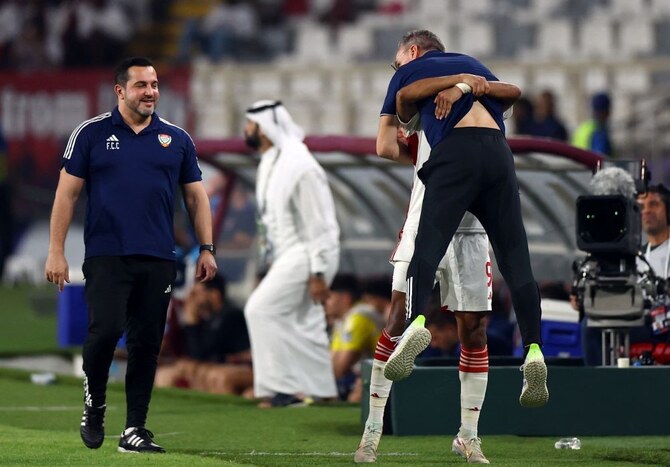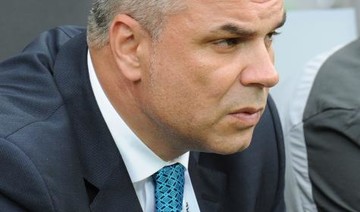DUBAI: Not even the UAE’s Golden Generation enjoyed a night quite like this.
Tuesday’s rampant 5-0 thrashing of Qatar turbo-boosted hopes of making a hallowed World Cup return for the first time since 1990 and emphatically earned redemption for a series of humbling results inflicted by their Gulf neighbour.
Such was the heightened feeling of bonhomie throughout the Emirates that a post-match McDonald’s visit by four-goal Fabio De Lima was interrupted by a grateful Al-Nasr supporter telling the star of Dubai rivals Al-Wasl: “Today, I love you.”
At times of great joy, a sense of perspective is hard to find.
Especially when celebrations follow a thumping of the double Asian Cup holders to earn one of the great occasions in your country’s footballing history, bettering the contentious semi-final defeat on home soil by Qatar in 2019’s edition.
Added momentum comes from last week’s 3-0 Group A victory against Kyrgyzstan, inspired by Shabab Al-Ahli star Harib Abdalla.
Much has been accomplished by the third-placed Whites, who are now within touching distance of the automatic qualification spots, but much remains to achieve on this tricky path to World Cup 2026.
“In this moment, it is normal that some people are really happy and, sometimes, out of control,” said boss Paulo Bento at Al-Nahyan Stadium. “It is important that we keep calm and be humble.
“That is the most important for us. They (the players) know how we, as a technical staff, think.
“We faced a very good team (Qatar), with very good players. Well managed, that have very good principles.
“We tried to choose the best strategy to control their best features and, at the same time, explore their weaknesses. The responsibility for that was the guys.
“They accomplished the game plan in the best way. We know it was difficult to predict how Qatar could play.
“The guys adapted themselves in the right way. To reach a result like this, it is important to be fair.
“In Uzbekistan, we had chances to score, but at the end, we were not effective. Today, we were really effective.
“All of this allowed us to reach this kind of result. But, in football, it is normal that the good ones are the guys that win and the bad ones are the guys that lose.
“Things are not like that. It was because we respect them (Qatar) that we won the game.”
The UAE’s second-ever entry into the world’s most important football event appeared to be slipping away after October’s disheartening 1-1 home draw with bottom-placed North Korea and 1-0 defeat against 10 men in Uzbekistan.
This once-perilous situation has changed for the better during a crunch November that has returned them to contention.
It also shifts the narrative around a UAE side typically viewed as talented, but unable to consistently deliver in clutch moments.
No one questioned the peerless ability of AFC Players of the Year Omar Abdulrahman and Ahmed Khalil, ruthless 2015 Asian Cup top scorer Ali Mabkhout and much of the preceding Golden Generation.
They even gained silverware at the 2013 Arabian Gulf Cup and represented their country with distinction at the London 2012 Olympics.
This cherished cohort did not, truthfully, come close to making World Cup 2014 or 2018. False dawns included memorable qualifying wins against Japan and Saudi Arabia, eventually rendered worthless by dropped points versus also-rans.
Neither could the emergent squad that followed for 2022’s cycle. They narrowly fell to Asian heavyweights Australia in the fourth round, without the injured De Lima.
The confines are still punishingly tight for 2026. Bento, his players and the UAE en masse, however, now hold tangible reasons to believe.
They are the third round’s joint-second top scorers with 12 goals — only an omnipotent Japan have more with 22. Their four goals conceded is bettered only by the Japanese (two) and Iraq (three).
Clubmates Yahya Al-Ghassani and Abdalla were at their freewheeling best this month. A centre-back pairing of Al-Jazira’s graceful Khalifa Al-Hammadi and Al-Ain’s redoubtable Kouame Autonne competes with anything on the continent.
Enviable strength in depth was provided by Fleetwood Town utility man Mackenzie Hunt, Wasl’s Tahnoon Al-Zaabi and veteran striker Caio Canedo.
Words can scarcely do justice to De Lima, his adopted country’s first “super hat-trick” scorer in World Cup qualifying. Three of these came before half-time, including a sumptuous free kick.
Further encouragement is provided by possible debut call-ups for more naturalised players when qualifying resumes with avisit to World Cup regulars Iran on March 20, 2025. These could include prolific Sharjah forward Caio Lucas, plus Al-Wahda’s promising defenders Lucas Pimenta and Alaeddine Zouhir.
A quartet of charged fixtures remain to bridge a three-point gap to second-placed Uzbekistan and their section’s final automatic spot, with leaders Iran a further three points ahead. The penultimate clash with the Uzbeks on June 5, 2025 looms large.
Qatar are only three points further behind. Their ambitions of gate-crashing the top two are not extinguished, despite the UAE’s pair of redeeming third-round wins against them.
Fail to make the most of this month’s 100 percent haul and the fourth-round lottery awaits. Even more jeopardy would follow for the UAE in the fifth round/inter-confederation play-offs.
Bento’s measured approach has patiently put his charges in a position to secure direct entry. A shot at legendary status is theirs to grasp.




























